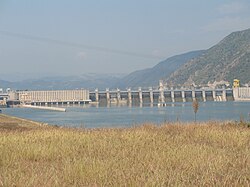Iron Gate I Hydroelectric Power Station

 Clash Royale CLAN TAG#URR8PPP
Clash Royale CLAN TAG#URR8PPP | Iron Gate I Hydroelectric Power Station | |
|---|---|
 Iron Gates seen from Kladovo | |
| Location | Iron Gate Serbia Romania |
| Coordinates | 44°40′15″N 22°31′45″E / 44.67083°N 22.52917°E / 44.67083; 22.52917Coordinates: 44°40′15″N 22°31′45″E / 44.67083°N 22.52917°E / 44.67083; 22.52917 |
| Construction began | 7 September 1964 |
| Opening date | 16 May 1972 |
| Dam and spillways | |
| Impounds | Danube River |
| Height | 60 m (200 ft) |
| Length | 1,278 m (4,193 ft)[1] |
| Reservoir | |
| Creates | Iron Gate I Reservoir |
| Total capacity | 2.1 km3 (0.50 cu mi) |
| Catchment area | 577,250 km2 (222,880 sq mi) |
| Surface area | 104.41 km2 (40.31 sq mi) |
| Power Station | |
| Turbines | Romania: 6 × 194.3 MW Serbia: 3 × 171 MW, 3 × 190 MW |
| Installed capacity | 2,249 MW |
| Annual generation | Romania: 5.24 TWh Serbia: 5.65 TWh |
The Iron Gate I Hydroelectric Power Station (Romanian: Porțile de Fier I, Serbian: Ђердап I/Đerdap I) is the largest dam on the Danube river and one of the largest hydro power plants in Europe. It is located on the Iron Gate gorge, between Romania and Serbia.
The Romanian side of the power station produces approximately 5.24 TWh annually, while the Serbian side of the power station produces 5.65 TWh.[2] The discrepancy in power output between the two halves is due to the generating equipment. While Romania's equipment is newer and thus more efficient (thereby generating more power), it is proving more unreliable; resulting in increased downtime for maintenance/repairs, and consequently lower annual power output overall.[3]
Contents
1 History
1.1 Modernization
2 See also
3 References
4 External links
History
The project started in 1964 as a joint-venture between the governments of Romania and Yugoslavia for the construction of a major dam on the Danube River which would serve both countries. At the time of completion in 1972, it was one of the largest hydroelectric power stations in the world with twelve units generating 2,052 MW, divided equally between the two countries at 1,026 MW each.[2]
The small inhabited island of Ada Kaleh was submerged during the construction.
Modernization
As the original turbines' 30 years lifespan came to an end, in 1998 the Romanian half of the dam started a program of modernization. As part of this program, the first of the turbines was stopped in 1999. By 2007 the program was completed and the Romanian half of the dam's operations were back to full capacity. The nominal capacity of each of the six units was increased from 171 MW to 194.3 MW, thus giving an installed capacity of 1,166 MW[4] and increasing the entire power generation capacity of the dam to 2,192 MW at the time. On the Serbian part of the dam, modernization started in July 2008;[5] so far Units 4 to 6.[6] The units are being upgraded with the help of Russian company Power Machines from Saint Petersburg, as well as their subcontractors with the participation of eleven domestic companies.
In addition to the upgrades, the Serbian side is planning on building a new, smaller power station, called Iron Gate III (Serbian: Ђердап III/Đerdap III).[7]
See also
- Iron Gate II Hydroelectric Power Station
- List of conventional hydroelectric power stations
- List of power stations in Romania
- List of power stations in Serbia
- Energy in Romania
- Energy in Serbia
References
^ Specifications
^ ab HE Djerdap (in Serbian) Archived 2009-08-13 at the Wayback Machine.
^ Politika: Đerdap još čeka majstore (in Serbian)
^ Hidroelectrica
^ "Archived copy". Archived from the original on 2009-06-27. Retrieved 2009-03-26.
^ Đerdap: Počela treća faza revitalizacije
^ "Archived copy". Archived from the original on 2009-10-06. Retrieved 2009-03-26.
External links
| Wikimedia Commons has media related to Iron Gate I hydroelectric power station. |
Description (in Romanian)